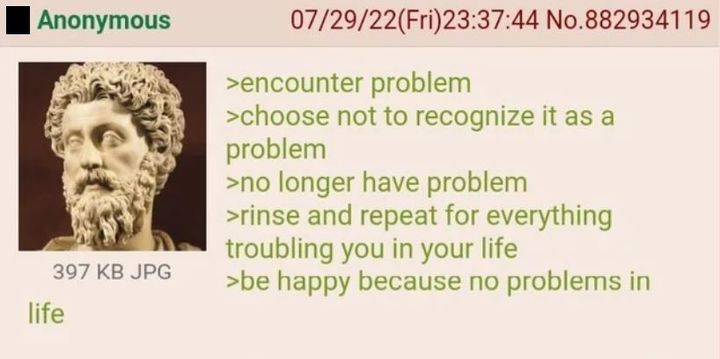this post was submitted on 29 Jul 2024
536 points (98.4% liked)
Greentext
5231 readers
2358 users here now
This is a place to share greentexts and witness the confounding life of Anon. If you're new to the Greentext community, think of it as a sort of zoo with Anon as the main attraction.
Be warned:
- Anon is often crazy.
- Anon is often depressed.
- Anon frequently shares thoughts that are immature, offensive, or incomprehensible.
If you find yourself getting angry (or god forbid, agreeing) with something Anon has said, you might be doing it wrong.
founded 1 year ago
MODERATORS
you are viewing a single comment's thread
view the rest of the comments
view the rest of the comments

One thing that can tangibly help is to lay out the consequences of inaction. Just knowing the worst case (among likely outcomes) can help reduce anxiety substantially. Then assess how much control you have in addressing the problem and getting a better outcome, and how much effort that will cost you vs the consequences.
A lot of anxiety comes from the unknown. We may not be able to completely unmask the unknown, but we can often estimate the consequences. For example:
And so on. If you can identify the worst case scenarios and your options, it's a lot easier to manage anxiety. Doing that can be uncomfortable, but it's basically what a therapist will do with you, so it's a great skill to learn.
This is a great technique, usually referred to as negative visualisation. Epictetus put it like this:
Hold death and exile and all that seems dreadful before your eyes every day, but most of all death: and you will never think of anything bad or desire anything too much.
Memento mori.
Sounds like a good way to develop a suicidal ideation problem.
Quite the opposite. It lets you forget the unimportant things and the constant realization that your time on this earth is finite will drive you to live life to the fullest.
I don't do it on purpose but I find myself comparing my problems to death fairly regularly and death doesn't always seem much worse. The fact that my time is limited and I have to spend so much of it just making the money I need to survive doesn't help.
I don’t have all the answers, and if budget allows it maybe you should talk to someone about that. That said there were times where waking up disappointed me and the following has changed me. There is another stoic attitude that says something like suppose you have died and you find yourself at the pearly gates. Peter decides you’re not done yet and he’s sent you back. That’s you today. The rest of your days are just gravy.
Sure, knock yourself out. :)